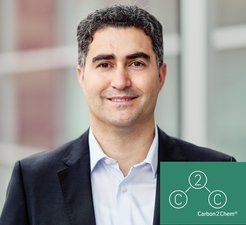MPI für Kohlenforschung continues to participate in the Carbon2Chem project for a climate-friendly industry:
Mülheim institute will provide mechanistic studies on catalysts

The Carbon2Chem project funded by the German Federal Ministry of Education and Research (BMBF) is entering its second phase. Carbon2Chem is about creating climate-friendly steel production and developing processes to turn steel mill gases into new useful precursors for fuels, plastics or fertilizers. The major collaborative project involves 17 partners from industry and academia - including the MPI für Kohlenforschung with its expertise in catalyst research.
"Having successfully developed carbon-based catalysts for converting steel mill gases into chemical feedstocks over the past three years, our focus in the upcoming project phase is on mechanistic studies on the catalytic transformation," says PD Dr. Harun Tüysüz, group leader at the MPI für Kohlenforschung, who is coordinating the project in the institute. The institute has received a grant of around 900,000 euros for the next four years to carry out studies on the activation and deactivation of the catalysts, together with groups from RWTH Aachen University and industrial partner Covestro. The upcoming studies aim at an even better understanding, which properties of a catalyst are important for efficient conversion of carbon monoxide (CO) from steel mill gases into intermediates for plastic production.
About Carbon2Chem
The aim of the Carbon2Chem project, which was launched in 2016, is to use steel mill gases that are emitted from blast furnaces during steel manufacture for the sustainable production of chemicals and materials. It is desired to make CO2 emissions economically viable in this way and thus achieve a climate-relevant CO2 saving effect. In the first funding period of the project, completed in 2020, the focus was on developing and researching suitable processes and testing their technical feasibility, economic viability and sustainability. To this end, among other things a joint technical center was opened at the Thyssenkrupp AG site in Duisburg and a project laboratory at the Fraunhofer Umsicht Research Institute in Oberhausen.
The second phase of Carbon2Chem® will validate the developed processes for large-scale implementation and thus lay the foundations for low-emission steel production. The BMBF has made a further 75 million euros available for this purpose until 2024.
Publication:
Bähr, A., Diedenhoven, J., Tüysüz, H. (2020). Cl2 Adsorption and Desorption over Ordered Mesoporous Carbon Materials as an Indicator for Catalytic Phosgene Formation, Chemie Ingenieur Technik 92 (10), 1508-1513, https://doi.org/10.1002/cite.202000040












